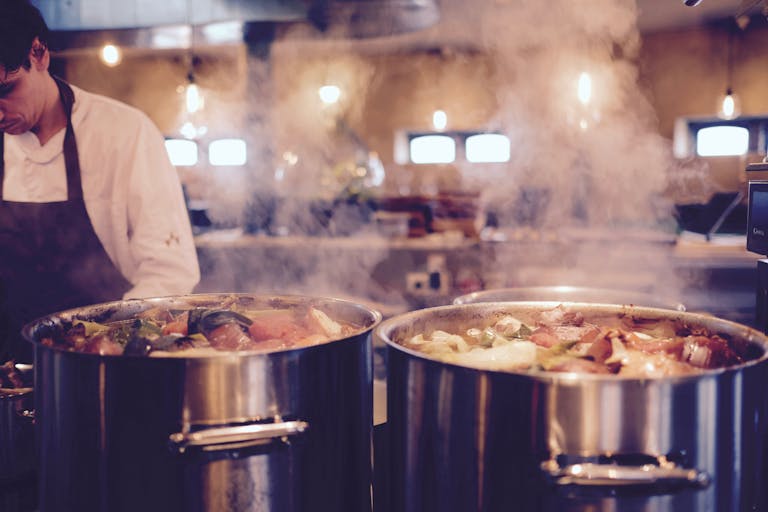10 BBQ Grill Cleaning Hacks for a Sparkling Grill Every Time
Cleaning your BBQ grill is crucial for safe and tasty cooking. From essential tools to steam cleaning and innovative hacks like using coffee or beer, these tips make grill maintenance a breeze.
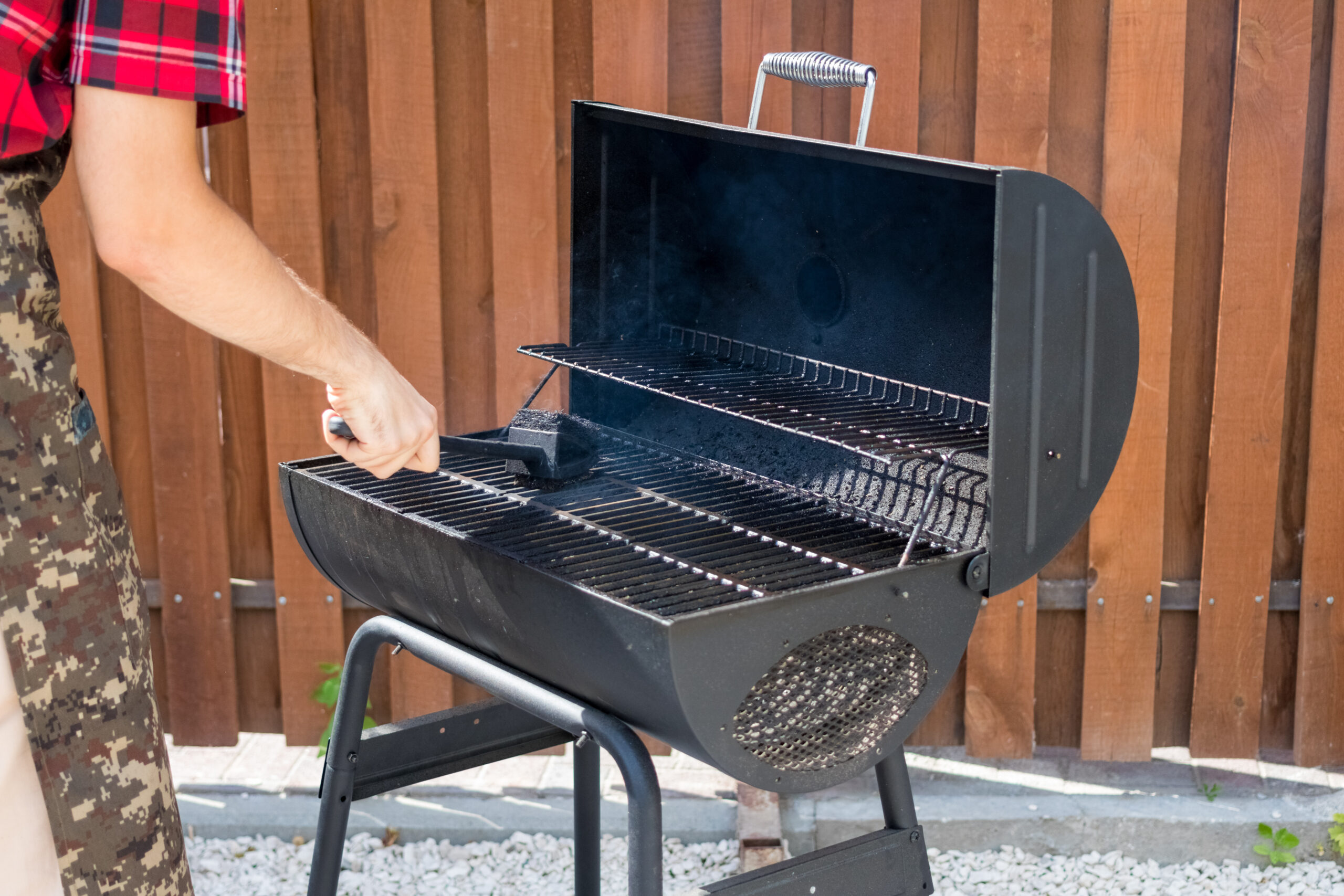
As the sun shines brighter and you gear up for those delightful backyard feasts, there’s one task that’s often overlooked until the last minute: cleaning your BBQ grill. Whether you’re pulling out your grill for the season or winding down after a day of barbecuing, discovering quick and effective cleaning hacks can transform this daunting chore into a simple task.
Disclosure: As an Amazon Associate, this site earns from qualifying purchases. Thank you!
Preparing Your Grill for Cleaning
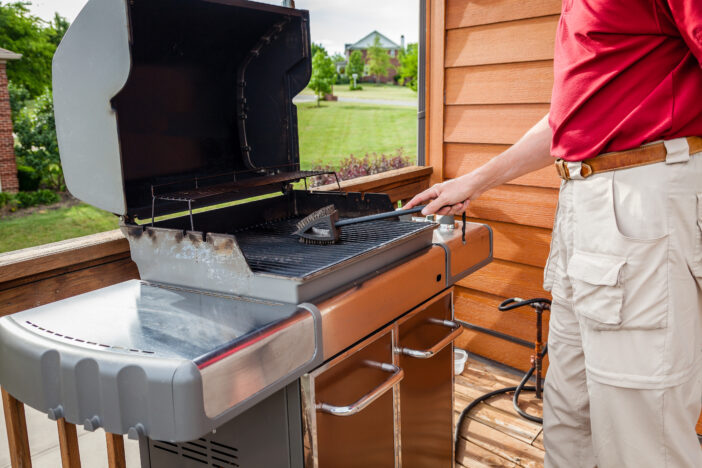
Before diving into the nitty-gritty of cleaning, let’s ensure your grill is ready for the process. Proper preparation can turn this daunting task into a breeze.
Why Pre-Cleaning Preparation Matters
First off, preparing your grill sets you up for success. It’s not just about getting rid of the visible gunk; it’s about safeguarding your health and the flavor of your food. Removing old grease, burnt food, and potential rust not only prolongs the life of your grill but also prevents harmful carcinogens from ruining your BBQ experience. Plus, a clean grill means even cooking and better tasting food.
Essential Tools and Supplies
Gathering the right tools before you start can save you time and effort down the line. Here’s a quick checklist:
- Gloves: Protect your hands from grease, grime, and chemicals. Opt for a durable pair.
- Grill Brush: A good quality grill brush will help scrub away tough residue without damaging your grates. Keep an alternative like aluminum foil on hand for sensitive surfaces.
- Cleaning Solution: Whether you prefer commercial cleaners like Easy-Off for heavy-duty jobs or a natural mixture of vinegar and baking soda, have your solution ready.
- Spray Bottle: Essential for those who go the vinegar route — it’ll help you apply your cleaning mix evenly.
- Scouring Pads or Scrubbers: For tackling the stubborn spots without scratching the surface.
- Protective Clothing: Optionally, wear old clothes you don’t mind getting dirty. And consider eye protection if you’re using aerosol cleaners.
Now that your arsenal is locked and loaded, you’re ready to tackle the cleaning with less hassle and more efficiency. Following these preparation tips ensures you get to the fun part faster — cooking and enjoying delicious BBQ with friends and family.
Utilizing Steam for Effortless Cleaning

When it comes to maintaining your BBQ grill, consider steam cleaning as a game-changer. Not only is it effective, but it’s also simple and eco-friendly.
- The Power of Steam: Steam’s high temperature softens tough grime, burnt-on food, and grease on grill grates, making them easier to clean without leaving any residue or odors behind. It’s safe for all grill types, including stainless steel, cast iron, and porcelain.
- The Covered Grill Method: After grilling, cover the hot grates with aluminum foil and close the lid. The trapped heat generates steam, loosening the residue in 10 to 15 minutes. Then, brush off debris without extra energy.
- The Water Bath Method: Heat water until steaming and pour it over the grates in a basin or sink. The steam blasts away burnt-on food and grease. After a few minutes, scrub the grates clean.
Both methods effectively utilize steam’s cleaning power, ensuring a visually clean and sanitized grill. Regular maintenance not only prolongs your grill’s life but also enhances food flavor. With steam cleaning, you’re opting for a safe, efficient, and eco-friendly solution.
Innovative Uses of Common Household Items
Transforming common household items into BBQ grill cleaning marvels can not only save you a trip to the store but also introduce eco-friendly methods into your routine. Let’s dive into how everyday items, right from your pantry or fridge, can become your grill’s best friends.
Cleaning With a Cut Onion
Believe it or not, a simple onion can make your grill grates look brand new. Here’s how you do it: Cut an onion in half, spear it with a fork, and rub it over the hot grates. The natural chemicals in the onion break down grime and fat, making it a breeze to wipe away residue. Plus, it’s a chemical-free hack that leaves behind a pleasant, smoky aroma. Opt for a hot grill to maximize the cleaning power of the onion’s juices.
The Wonders of White Vinegar
White vinegar isn’t just for salads—it’s a powerful cleaning agent for your BBQ grill. Create a mix of equal parts water and white vinegar, spray it onto your grill grates, and let it sit for about an hour. The acidity of the vinegar will dissolve grease and grime, making it easy to scrub off with a grill brush. For an extra kick, use pure vinegar on tougher stains. Not only will your grill be spotless, but it’ll also be sanitized, thanks to vinegar’s natural antibacterial properties.
Utilizing Baking Soda for Stubborn Grease
Baking soda is another household hero that tackles even the toughest grill gunk. Make a paste using baking soda and water, apply it to the grates, and let it sit for a few minutes. The soda’s abrasive texture aids in scrubbing away stuck-on food and grease without harming the grill’s surface. For hard-to-reach areas, use a toothbrush to apply the paste. Rinse thoroughly after cleaning, and you’ll be amazed by the shiny outcome.
Leftover Beer as an Unconventional Cleaner
Got some leftover beer from your last BBQ? Put it to good use by pouring it over warm grill grates. The alcohol in the beer breaks down the grease, and its slight acidity helps to clean without the need for harsh chemicals. Just pour, let it sit for a few minutes, and then scrub away. Not only does it clean, but it also gives an excuse to open up a beer while you’re at it. Plus, the beer leaves behind a subtle, malty scent that complements your next grilling session.
By turning to these readily available household items, you’re not only making cleaning simpler but also more environmentally friendly. Give these hacks a try, and you’ll see just how easy and effective grill maintenance can be.
Deep Cleaning with Dish Soap
After exploring eco-friendly and simple maintenance hacks, it’s time to dive into deep cleaning your BBQ grill using dish soap. This method is particularly effective for tackling tough grease and grime without the need for harsh chemicals.
Step-By-Step Guide to a Soap Scrub
- Prepare Your Cleaning Solution: In a large bucket or basin, mix warm water with a squirt of grease-cutting dish soap, such as Dawn. Ensure the solution is sudsy and strong enough to cut through tough grease.
- Submerge the Grates: If your grill grates can be fully immersed, place them in the soapy water. For larger grates that don’t fit, you’ll need to soak one half at a time, flipping them over to ensure both sides are cleaned.
- Soak: Let the grates sit in the solution for at least 15 to 30 minutes. This soaking time allows the soap to break down the grease and burnt-on food particles.
- Scrub: After soaking, don some rubber gloves and use a sturdy grill brush or scrubbing pad to clean the grates. Be gentle with porcelain-coated grates to avoid damaging them.
- Rinse and Dry: Once you’ve scrubbed the grates clean, rinse them thoroughly with clean water. It’s crucial to remove all the soap residue. Allow the grates to air dry or dry them with a clean towel.
Mixing Dish Soap with Baking Soda for Extra Power
For grills that have seen better days and need a bit more elbow grease, enhancing your dish soap solution with baking soda can make a big difference.
- Create a Paste: Mix three parts baking soda with one part water in a bowl. Add a few drops of your dish soap to this mixture to form a thick paste.
- Apply to Grates: Using a sponge or brush, apply the paste directly onto the grates, focusing on the most problematic areas. If you’re dealing with particularly stubborn spots, let the paste sit for several minutes before scrubbing.
- Scrub: Use a scrubbing brush or pad to work the paste into the grime. The baking soda acts as a gentle abrasive, helping to lift off burnt-on food and grease without damaging the grill grates.
- Rinse Thoroughly: After you’ve scrubbed the grates clean, rinse them under hot water to ensure all the cleaning paste is washed away.
- Dry: Pat the grates dry with a towel or let them air dry completely before reassembling your grill.
This deep-cleaning method not only ensures your BBQ grill is ready for grilling season, but it’s also a safe and environmentally friendly way to maintain your equipment. By regularly using these simple dish soap hacks, you can keep your grill in top condition for many BBQs to come.
In the video, BBQ and Bottles explains –
BBQ and Bottles
- Spring Cleaning Routine: The video focuses on performing a thorough deep clean of a gas grill, typically recommended once a year, especially before the summer grilling season starts.
- Tools Required: Various tools are needed for the cleaning process, including a grill brush, grill floss, scraper, stainless steel wool, scouring pads, dish detergent (preferably Dawn), steel buffer or cleaner, and oil for seasoning.
- Grill Floss for Grate Cleaning: The use of grill floss is highlighted as an effective alternative to grill brushes for cleaning grates, avoiding potential metal fibers in the food.
- Soaking Grates and Flavorizer Bars: After scraping off large chunks, grates and flavorizer bars are soaked in hot water with dish detergent (Dawn) to loosen grime.
- Scraping and Brushing Interior: The interior of the grill is scraped to remove debris and then brushed down to ensure thorough cleaning around burner elements and edges.
- Cleaning Grease Tray: The grease tray is emptied and cleaned separately to remove built-up grease and debris.
- Scrubbing Exterior Surfaces: Exterior surfaces, including the sides, lid, and knobs, are scrubbed with soap, water, and scouring pads to remove grease and grime.
- Rinsing and Drying Components: All cleaned components are rinsed with cold water and dried thoroughly before reassembly.
- Re-seasoning Grill Grates: After cleaning, grill grates are re-seasoned with an all-natural oil to prevent food from sticking and maintain seasoning.
- Final Steps: The burners are turned on to medium heat for a few minutes to complete the seasoning process, and the exterior surfaces are polished with stainless steel cleaner for a shiny finish.
The Surprising Cleaning Properties of Coffee
Dive into an unexpected cleaning hack: coffee. This morning staple doubles as a potent degreaser for your BBQ grill grates.
How it Works
- Brew a strong pot of coffee.
- Submerge grates in the coffee for at least an hour or overnight.
- Scrub grates with a brush or pad.
- Rinse with warm water for refreshed, cleaner grates.
Why it Works
- Coffee’s acidity breaks down tough grease and burnt-on food particles.
- The method is gentle yet effective, avoiding harsh chemicals.
- It’s eco-friendly, utilizing leftover coffee in a new way.
Embrace this surprising hack to keep your grill sparkling and your cleaning routine green.
Alternative Cleaning Tools and Techniques
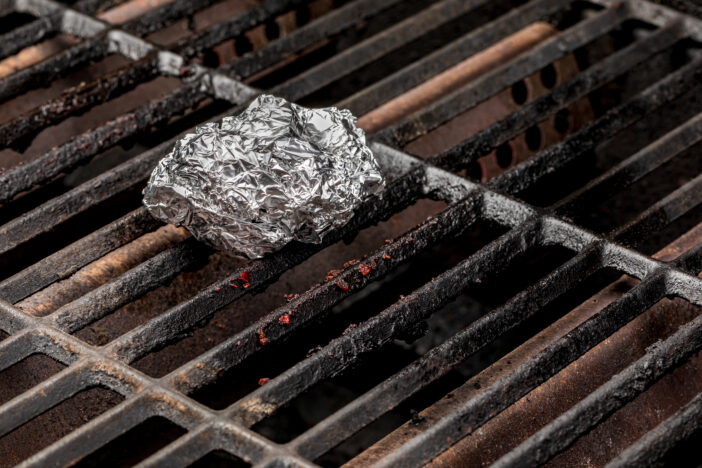
Enhance your BBQ cleaning routine with unconventional methods that deliver exceptional results. Skip the pricey scrubbers and opt for aluminum foil – a budget-friendly and effective solution for tackling stubborn grime on your grill grates. Its abrasive texture ensures a thorough cleaning without damaging porcelain coatings.
While focusing on grates, don’t neglect the base and drip pan. Cleaning these areas isn’t just about aesthetics; it’s crucial for safety and flavor. A clean base minimizes flare-ups and enhances heat distribution, resulting in a tastier BBQ. Utilize a simple mixture of dish soap and hot water to break down grease, or employ a gentle baking soda paste for stubborn spots. Rinse and dry thoroughly for a safer and more enjoyable grilling experience.
Maintaining Your Grill Post-Cleaning
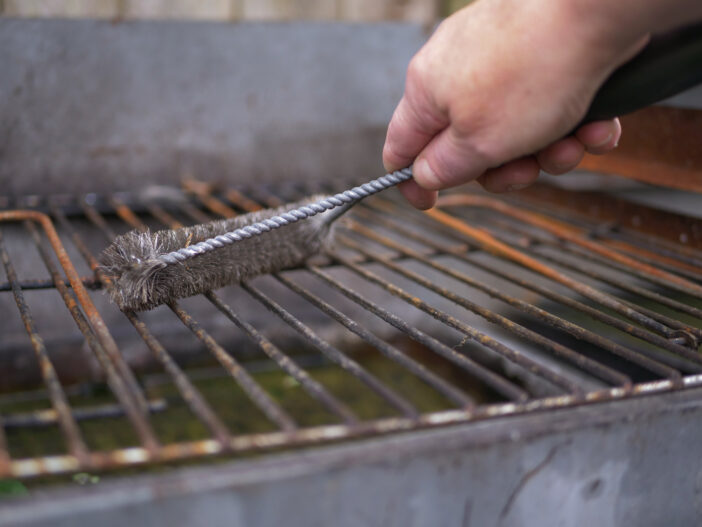
After eco-friendly scrubbing and shining with coffee grounds, it’s time to focus on post-cleaning care. Dispose of collected oil and fat responsibly, avoiding drains and lawns. Consider recycling programs for greener disposal.
Don’t forget the crucial step of heating your grill post-cleaning. This burns off residue and re-seasons the grates, ensuring a safe, non-stick surface for your next BBQ. Just allow it to cool before covering to prevent rust. These simple practices ensure your grill stays in top shape for your next cookout.
Preventive Measures to Keep Your Grill Clean Longer
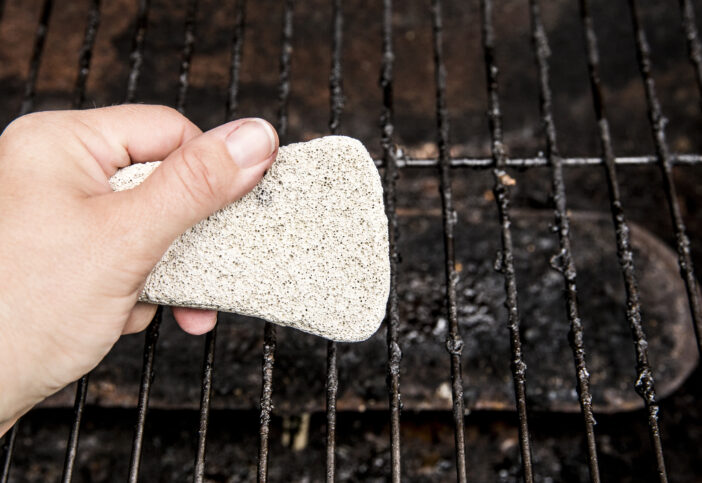
To savor the joy of grilling all season long without the dread of deep cleaning, adopting preventive measures is key. These strategies not only extend the life of your grill but also ensure it’s always ready for the next cookout.
- Oil the Grates Before Cooking: Before you heat your grill, lightly oil the grates. This doesn’t just prevent food from sticking during cooking but also makes post-grill cleanup easier. Use a paper towel soaked in cooking oil and rub it over the grates using tongs.
- Heat It Up: After each use, allow your grill to run on high heat for around 15 minutes. This burns off residual food particles and grease, turning them into ash that’s easily brushed away.
- Cover Your Grill: When not in use, always cover your grill. Exposure to the elements can lead to rust and additional grime buildup. A grill cover is a small investment that pays off by keeping your grill cleaner for longer.
- Check for Grease: Regularly inspect your drip trays and catch basins for grease accumulation. Cleaning these areas frequently prevents overflows and reduces the risk of flare-ups.
- Onion Scrub: Once your grill is hot, use half an onion on a fork and rub it over the grates. The onion’s natural juices help remove grime and residue, adding a layer of flavor for your next barbecue session.
- Steam Cleaning: Right after cooking, while the grill is still warm, place a damp cloth or paper towel inside, close the lid, and let the steam do the work. After a few minutes, open the lid and brush the grates. The steam loosens particles, making them easier to scrape off.
- Vinegar Spray: Mix equal parts of water and vinegar in a spray bottle. Once you’re done grilling, while the grill is cooling down but still warm, spray this solution onto the grates. Close the lid for a few minutes, then open and brush. The acidity of the vinegar helps dissolve grease.
By integrating these simple yet effective practices into your grilling routine, you’ll ensure your BBQ is always in top condition, ready to fire up at a moment’s notice. Remember, a little effort after each use goes a long way in maintaining the longevity and performance of your grill.
Frequently Asked Questions
What eco-friendly items can you use to clean a BBQ grill?
Eco-friendly items that are effective for cleaning a BBQ grill include onions, white vinegar, baking soda, and beer. You can also use dish soap for a deeper clean. These household items help remove tough grease and grime from grill grates naturally.
How can I prevent my grill from getting dirty quickly?
To prevent your grill from getting dirty quickly, oil the grates before cooking, heat the grill after each use to burn off residue, cover the grill when not in use, and regularly check for grease accumulation. These measures help maintain cleanliness and extend the life of your grill.
What is the best method to remove tough grease from grill grates?
For tough grease on grill grates, create a paste using equal parts of baking soda and water. Apply the paste, let it sit for a few minutes, and then scrub off with a brush. This method is effective in removing stubborn grease and grime.
Can I use beer to clean my grill?
Yes, you can use beer for cleaning your grill. Pouring beer over a hot grill helps loosen and remove food particles and grease. It’s a natural and eco-friendly cleaning option that also adds a unique flavor to the grill for your next BBQ.
How do I maintain my grill’s cleanliness with a vinegar spray?
To maintain your grill’s cleanliness with a vinegar spray, mix equal parts of water and white vinegar in a spray bottle. Ensure the grill grates are cool, then spray the solution. Let it sit for about 10 minutes before scrubbing. This method effectively breaks down grease and food residue.






